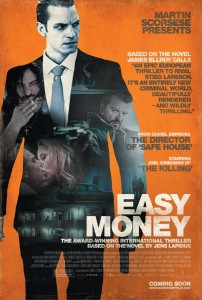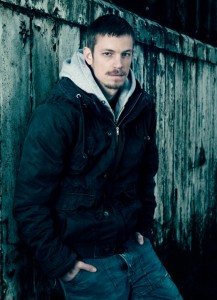Television mystery fans know him as the rule-breaking, dogged Seattle police detective Steven Holder on THE KILLING. Science-fiction film fans are looking forward to his portrayal of the title character in the upcoming remake of ROBOCOP. But in his native Sweden, Joel Kinnaman is already well-known for his star turn as Johan “J.W.” Westlund, a college student turned out-of-his-depth drug trafficker in EASY MONEY.
Based on the best-selling novel SNABBA CASH by Jens Lapidus, EASY MONEY is a mixture of crime thriller and social commentary as we see how a group of diverse people clash over a complicated mixture of drugs, cash, ego, family responsibility and status. The film came out inSweden two years ago and is currently in theaters and presented by the Weinstein Company and Martin Scorsese.
In a conference room within the Weinstein Company offices, Kinnaman holds an electronic cigarette. He seems remarkably alert for someone who’s just flown from Stockholm to Los Angeles the night before on an approximately sixteen-hour flight. “I’m surprised I am awake,” Kinnaman confesses. “I’m getting real good at [international flights] – every trip, I’m out for a week, but now I get it right. I usually stay up the night before and sleep like an hour or something, and then I get some sleep on the plane, and then I’m usually all right.”
Although he’s still in the process of sorting out exactly what airline to take – asked which is the best for the Sweden/California run, Kinnaman laughs, “It sure isn’t the one I’m flying.”
EASY MONEY director Daniel Espinosa and Kinnaman were already friends when Espinosa became attached to direct the project. Kinnaman was delighted when Espinosa asked him if he’d like to play J.W. There was just one catch that neither of them thought about in advance, Kinnaman relates – the studio and the financiers had to okay the casting of their then-mostly unknown lead.
“It’s a best-selling book in Sweden, and I was actually in the last year of acting school when I read it,” Kinnaman says. “And at this point, I had done three movies, one small part and two medium parts, and only one of those movies was successful. It was actually quite successful, but I didn’t have the lead. I wasn’t a name in Sweden at all. And I was in the last year of acting school. But I was feeling pretty confident.”
So confident, Kinnaman continues, that he went around saying he was going to play J.W. in the film, before Espinosa had to break the news that there were other people weighing in on the casting decision.. “I mean, I told everybody,” says Kinnaman. “Now I had to audition for J.W. I was so nervous. I had to audition seven times. I went in and I could only lose it.”
By this, Kinnaman explains, he means that from his point of view, he had the role and the auditions might take it away from him. “Usually, when you audition for something, you’re a little competitive and there’s some chance of winning,” he adds. “Here I could just lose it. So I was a really strung-out emotional and psychological wreck after that. But then finally I got it.”
How did Kinnaman go about playing the multifaceted J.W.?
“My first idea around him was based on the [perception] that he had a complex nature that is contradictory,” says Kinnaman. “He’s a very confident person, but with very low self-esteem, and I think that’s an interesting combination. It’s more common than we think. And then he’s also a chameleon in many ways. I read it as that he has this void within him, because for him, it’s often been enough to seem, and it’s not that important just to be something real. The choices of his life have led him further and further away from who he himself is, so that at this age that he is now, he has no idea who he is. And that leads a person with initially a very good heart to make extremely bad decisions. And that was very fun to play. It’s also fun to play a character that is an actor in [the film’s] reality, who is a chameleon. There is a part of a performance that English-speaking audiences won’t pick up on this – I made a big effort to [show that] his dialect changes with every person that he meets. His dialect is also a chameleon, so that when he’s with the upper class, he talks like they do, with their dialect, and when he’s with the criminals, his way of speaking changes and echoes them. That’s quite difficult, it takes a lot of work and research, but it’s one of those fun things to do.”
Kinnaman says that he and director Espinosa had a good time working together on EASY MONEY – the two have since reteamed on the thriller SAFE HOUSE – but this doesn’t mean they always agreed.
“We had a very good work relationship,” he says. “I think the battles that me and Daniel had in many of the scenes were, he had such difficulty liking this character.” Kinnaman adds he had the same issue with J.W. “It’s also I grew up in a working-class neighborhood in Sweden, which during my teens, gentrified and is now completely middle class and even upper middle class. But the sort of atmosphere of that neighborhood was the kids from the east side, which is like the rich side of the inner city, we hated them. We would go there and beat them up and take their things,” Kinnaman acknowledges with a rueful laugh. “And for somebody from my neighborhood to aspire [to be like] or revere a person from the upper class [as J.W. does], that is the most ugly and pathetic behavior you could do,” he adds. “And Daniel’s from the suburbs that are even more – they feel the same way about all the people from the inner city.
“So this working-class kid that J.W. is comes to Stockholm, because he’s from the North, which is also an aspect of the movie that gets lost [for U.S.audiences],” Kinnaman continues. “He sort of represents Sweden in many ways, because the North of Sweden is very socialist and poor and feel very left out, and despise Stockholmin many ways, because Stockholm has become much more Americanized. And that whole strife mentality is not a Swedish mentality, that’s sort of an imported mentality, and [J.W.] sort of represents that. So Daniel thought it was going to be really difficult for this character to be liked by the audience. I didn’t have that fear. I was sure that they would find him compelling. But Daniel’s way of making sure of that is, he wanted to make him vulnerable, which I thought was very important, too. But he wanted to make him vulnerable more than I wanted to;. I wanted to make him more capable in certain situations. So those were our battles. I think we won half of them each in the way we played the scenes.”
A stage production of Dostoyevsky’s CRIME AND PUNISHMENT helped Kinnaman form his views on playing characters who are less than sympathetic, the actor says.
“It was a new adaptation of CRIME AND PUNISHMENT by Dostoyevsky, and I played [the lead] Raskolnikov,” says Kinnaman. “It was actually the first thing I did when I got out of acting school. I had gone through my whole four years of acting school sort of promoting this idea [that] in Sweden, and I think a lot of Europe, there’s this old romanticized idea of the wounded artist. And in Sweden, a lot of people gave themselves the right to be alcoholics, because they are wounded artists. And I always felt that that idea was just such a stupid thing that I felt came from bad confidence, [the fear] that you can’t access those areas and maybe those experiences of your life that maybe you haven’t had, so that you were trying to create it by yourself. And I’ve gone through it in acting school, and I was like, “That’s just bullshit.” I also felt that a lot of those performances, when people were playing [characters] that went through depression or were mentally ill, the people that were in that whole world of being a wounded artist, that was how they wanted to present themselves to the world. I always felt that their performances were usually very limited, and you could never see the struggle in the person, because they were actually trying to be depressed. A depressed person is not trying to be depressed, he or she is trying to feel better, and somebody that’s mentally ill is striving to feel good and striving to be normal, and I could never see that strife in their performances.”
“Raskolnikov” was this opportunity Kinnaman explain.
“Now it was up to me to prove my point,” he says. “It’s a character that I read as borderline schizophrenic, he’s starving himself to death and then he goes through his severe psychosis, at the same time while he’s finding true love for the first time. I mean, it’s an incredible journey. So I really tried to intimate this idea, and it really worked. And I was really happy with that performance. People said they’d never seen more life in that performance, but also not as much depression, either. And that’s how I think it is, because if you raise the high, the low is going to lower. It came back to an idea that I had about, usually when you meet a person, you get an idea of who they are and you place them in a cabinet, “That’s who you are,” but not until that person does something that completely contradicts that, that’s when you get the feeling of, “Oh, that’s who you are.” Because then you see the whole span of their personality. And that’s something that I try to bring to my performances, because I think that’s where you can make an interesting character, if you just find the contradiction. And what I found out is that you can – the audience will really believe you. You have a lot more leeway to be contradictory than most of the scripts have in them, because I think that’s how we all are. We have so many more different sides of ourselves, and we’re so different when we’re meeting with different people, so I think audiences relate more to that and find that more believable than I think a lot of scriptwriters do.”
Sometimes, of course, the character has to seem like a certain type of person for plot purposes, especially when the audience is being misled to an extent. This was the case with Holder in THE KILLING.
Kinnaman says he recognizes this necessity in storytelling terms, but still, “It was something that was really frustrating to me as an actor, even though I’d been longing to do a part in a TV series, a much longer arc [than in a feature film].”
“I hadn’t done that before,” he says. “But I was really frustrated because I didn’t feel I was allowed to play all the colors of the character, because they wanted to manipulate the audience to feel that they didn’t know if they liked this character, and then they’d come round. But for me as an actor, I felt that I couldn’t play all the colors, and that was really frustrating. I was like, ‘Here I could laugh, make a joke,’ and they were like, ‘No, no, no, he’s got to be serious.’”
However, Kinnaman is quick to add that he thought the choices made by THE KILLING creative team were brilliant. “I thought in THE KILLING, [Holder] giving young girls weed, I thought that was fantastic writing,” he adds. “I thought that was really brave writing, because that’s just something that you automatically have to defend. You challenge the audience there.”
These types of characters are particularly attractive to Kinnaman. “A person who does so many horrible things, and you are kind of rooting against him, but you’re still with him in a sense, because you understand him,” he explains. “And you don’t like him as well, but you’re still with him. I’ll actually use that when I’ve been in discussions with scripts – ‘We need to go further. We don’t want to push the audience away, but look at this.’”
Kinnaman can’t tell us whether there will be a third season of THE KILLING however. “I haven’t heard anything,” he adds.
As for ROBOCOP, Kinnaman does give a little tease.
”It’s a re-imagining,” he says. “There are ideas from the first movie, but it’s a completely new take on it and we have a fantastic director, Jose Padilha. He reminds me in some ways of Daniel Espinosa. He’s a very confident, very bold director. He wrote, directed and produced – and the second movie he also distributed – the two highest-grossing films [ELITE SQUAD and ELITE SQUAD: THE ENEMY WITHIN in Padilha’s home country] Brazil, which means a hundred and fifty million people audience. You need that kind of a strong force and a director who can deal with a big studio, a person who can stand his ground on certain things and know which battles are worth fighting, and where you compromise. And if you see his movies, you know that he’s a very talented actor’s director – the acting is superb in his films and the action is very believable. And then you have his knowledge of the robotic and neuroscience, an understanding of where the cutting edge is right now.”
Related: Movie Review: EASY MONEY
LET YOUR VOICE BE HEARD – COMMENT BELOW!
Follow us on Twitter at ASSIGNMENT X
Fan us on Facebook at ASSIGNMENTX
Article Source: Assignment X
Article: Exclusive Interview with THE KILLING star Joel Kinnaman on EASY MONEY and ROBOCOP remake
Related Posts:













